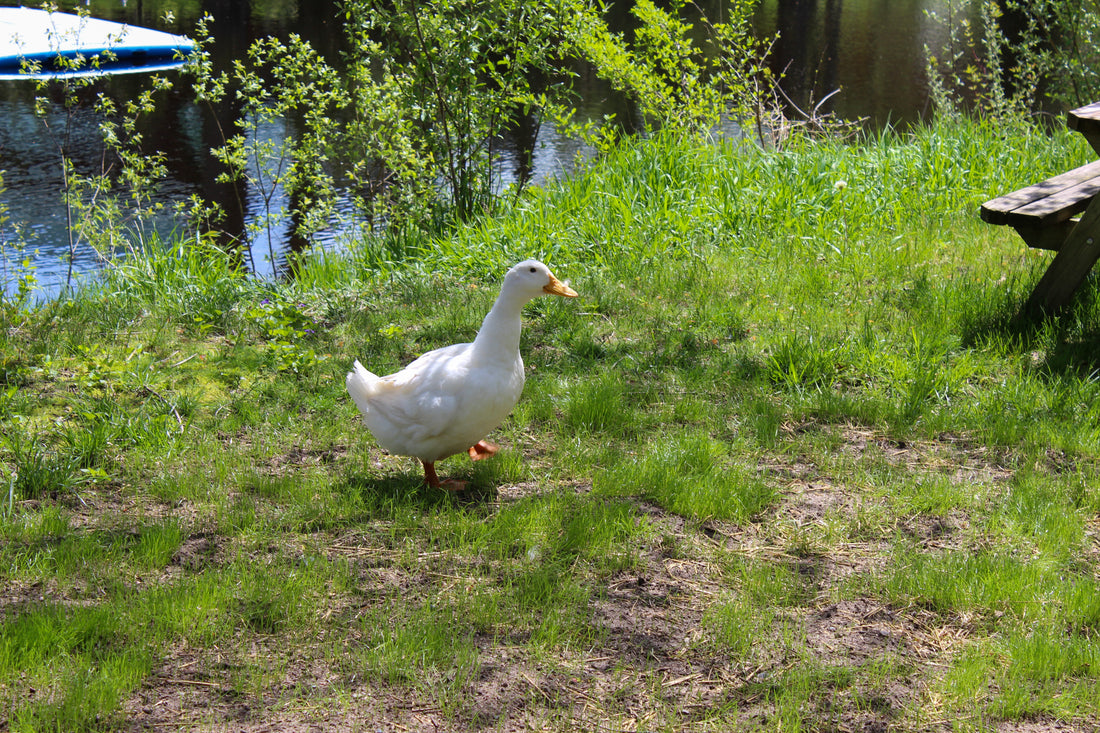
Lucky Ducks

This spring, we experienced a miracle at Avalon: For the first time in four years, our ducks survived the winter. Every morning at breakfast, we mimic McCloskey’s old woman from Beacon Hill as they parade past the window: “Isn’t it amazing?” The daffodils are starting to fade here, but our astonishment hasn’t. To really appreciate the hand of divinity in this situation, you must understand how solidly the deck is stacked against these dear, dumb ducks.

We’ve been raising–or, trying to raise–Pekin ducks ever since we moved to our current property with a pond. The charming aesthetic of white, fluffy ducks paddling around in the water has been a long-cherished hope of my husband’s. But his aspirations have been thwarted again and again by an aggressive raccoon, by a series of snapping turtle attacks, and by the efficient maneuvers of an extremely sly fox. The difficulty is always getting the pea-brained birds to get themselves safely tucked in for the night, before the darkness renders them absolutely defenseless .We’ve resorted to a grudging evening routine of rounding them up and walking them home. Tramping out in the snow after dark to put the birds to bed is no one’s favorite chore, but it beats the vivid alternative of waking up to scattered feathers and a red trail leading into the woods.
Besides the threat of predators, one must contend with the native stupidity of these birds, who will get tangled in vines, stuck on one side of a fence (inches from the open gate), or even caught in underwater vegetation and drowned while fishing. They are hopelessly dependent, domesticated to a fault.
There was one year when a drake and a hen made it to March and we were so delighted that we broke a firm family rule and named them: George and Martha. The very next day, George was found decapitated in the pond, victim of a snapper. Despite our efforts to eradicate those violent reptiles, they lurk in the depths, silent and pitiless. Thus were we repaid for our fit of sentimentality.
So this year’s survivors, a trio of two hens and a drake, remain nameless. But they are direct descendants of the Washingtons; before George flew off to dabble in the celestial marshes, we collected a clutch of fertilized eggs and tucked them under a broody chicken.

There was, alas, no question of allowing Martha to operate as a single mother. The more experience I gain with barnyard animals, the more impressed I am with the realism of Beatrix Potter’s stories. Our Pekins have both the bearing and the carelessness of her irresponsible Puddleducks. While I haven’t seen one actually taking herbs for an omelet to a fox, I have seen one lay an egg on the incline of the bank, and walk away as her precious offspring rolled into the water. I have even found a neglected egg, humpty-dumptied beyond repair, inside one of our basement window wells. It’s not that I think that ducks lack maternal feelings, but it does seem like they lose interest in the family experiment well before the incubation period is over. (Rebecca, pictured here, has been sitting on an egg for about 10 minutes and is already, clearly, on the brink of despair.)
And so each subsequent generation is warmed, hatched, and coddled by a motherly chicken. Naturally, the little ones awaken to a world of chickens, learn to act like chickens, and imprint on a chicken who is a sufficient guardian in every way except for one: she cannot teach them anything whatsoever about Water.
Ducks desperately need swimming water to stay clean and healthy. A line of ducklings waddling after a foster-chicken is adorable, but there comes a day when, for their own good, a self-respecting homesteader must herd those birds into the pond and help them discover that they were made to swim. The instinct kicks in immediately: there is no learning curve when a duck takes to water.
The three marvels who made it through the winter must have heard stories, though. For while they’ll pit-pat down to the pond and take their daily baths, they keep close to the shore. Not once have they ventured out into the middle, despite the allure of the rippling water and the abundant minnows. Perhaps their chickeny upbringing unsuited them for the pleasures of swimming. Or perhaps some echo of their late father’s dying quack hovers over the deep, warning them that there be dragons…

2 comments
Loved it all, but this was my favorite bit: “It’s not that I think that ducks lack maternal feelings, but it does seem like they lose interest in the family experiment well before the incubation period is over. (Rebecca, pictured here, has been sitting on an egg for about 10 minutes and is already, clearly, on the brink of despair.)”
Delightful story telling, Laurel.